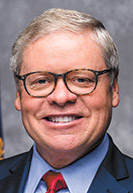Subscriber Benefit
As a subscriber you can listen to articles at work, in the car, or while you work out. Subscribe Now
Beer wholesalers want the ability to sell liquor-based ready-to-drink cocktails in Indiana, an increasingly popular line that liquor and wine wholesalers want to keep for themselves.
For a second consecutive year, beer wholesalers have taken the fight to the Indiana General Assembly.

The Indiana House last month approved legislation that would put liquor-based mixed beverages under a wine license, allowing beer wholesalers to sell the products. House Bill 1025, authored by Rep. Ethan Manning, a Republican from Logansport, now awaits an uncertain fate in the Indiana Senate.
“For the good of our marketplace, we should just leave this alone,” said John Baker, chief operating officer for Indianapolis-based National Wine & Spirits Inc., a wine and liquor distributor. “The state of Indiana has more urgent matters to address than carving out another piece of business and awarding it to protected wholesalers.”
Beer wholesalers, however, are quick to point out that wine and spirits wholesalers could continue to sell the products under the legislation. They say the bill merely creates a level playing field.
“There is no public-policy reason why a beer distributor cannot also distribute mixed beverages,” said Stanley Ziherl, president of Five Star Distributing, which is based in northeastern Indiana. “Many of these mixed beverages are being manufactured by our traditional brewery partners that we’ve built lasting business relationships [with] over the generations.”
Furthermore, popular name brands like Cutwater Spirits, High Noon and White Claw contain an alcohol-by-volume percentage similar to that of beer and are already sold alongside beer in grocery stores across the state, he said.
Entry into that market could be quite lucrative for Indiana beer wholesalers. Liquor-based ready-to-drink beverages have become the fastest-growing spirit category.
While no Indiana-specific numbers were immediately available, the Distilled Spirits Council estimated that national sales of pre-mixed cocktails surged 35.8% from 2021 to 2022 to reach $2.2 billion.
These products are made by all types of manufacturers, which has made regulating the products a complex task.
“These lines between suppliers are a lot more fuzzy than they used to be,” said Manning, the bill’s author, speaking on the House floor last month. “Consumer tastes are changing, and so is the industry along with them.”

Sen. Ron Alting, a Republican from Lafayette who chairs the Senate Public Policy Committee, declined to give a nearly identical bill a hearing last year, and it’s unclear whether he has changed his mind this time around.
In an interview with IBJ, Alting expressed satisfaction with the current regulatory framework but declined to say where he stood on the legislation.
“As chairman, I’ve always liked to say that I’d like everyone to stay in their own lane,” Alting told IBJ. “The three-tiered system [of manufacturing, wholesale and retail alcohol permits] is working great. Everyone’s making money. The public’s getting service. The accessibility is out there.”
Senate President Pro Tem Rod Bray, R-Martinsville, deferred to Alting when asked if he supported the legislation.
“Sen. Alting is going to make a decision as to whether he hears it or not. If he does, and it moves out of committee, then we’ll have a broader conversation about it,” Bray said.
Indiana’s tricky liquor laws
Indiana is somewhat unique when it comes to its laws around alcohol.
After Prohibition ended in 1933, Indiana joined most states in adopting a three-tier system for sale of alcohol, dividing alcohol permits into manufacture, wholesale and retail. Apart from a few carveouts, members in one tier cannot have a financial interest in another tier.
State law allows for combined wholesale licenses. Wholesalers typically have either a combined beer and wine license or a joint liquor and wine license. Overlap is rare, which is why liquor wholesalers feel so strongly that the beer industry will be infringing on their turf.
During House testimony on the bill, several beer industry representatives argued that the system is archaic by pointing out that Indiana is the only state without government-run alcohol sales systems that doesn’t allow beer wholesalers to distribute spirit products.

The current fight over mixed beverages is similar to a legislative battle that occurred around the turn of the century, when a debate over who could sell malt beverages came to a head.
Lawmakers decided to place those beverages within the wine wholesaler license to allow all wholesalers the opportunity to compete to sell them. Supporters of HB 1025 are using that argument to bolster their case.
Tyler Starkey, executive director of the Indiana Beverage Alliance, which represents 18 beer distributors across the state, said allowing his members to sell mixed beverages is a minor change that won’t have an impact on the three-tiered system.
“From a standpoint of leveling the playing field, we’re just asking [for] what the liquor wholesalers can already do now,” he said. “They can sell flavored beer. We’re asking to sell flavored spirits. Neither one is asking to distribute the core products of the other, and that is a separate public-policy discussion.”

But distributors of wine and spirits say the change tilts an already uneven market that favors the beer industry, which benefits from franchise protections not available to spirits wholesalers.
Tom Morgan, executive vice president of Republic National Distributing Company of Indiana, called the bill “predatory and one-sided.”
“Once again this year, I struggle with the notion that we are debating a piece of legislation that has nothing to do with what is good policy,” Morgan said. “Rather, its sole intention is to give one set of companies who, candidly, are among the most privileged companies in our state, the ability to exclusively come after the business of other Indiana companies.”
Overhaul coming?

During House committee testimony on HB 1025, Rep. Jake Teshka, a Republican from South Bend, offered an amendment that would have allowed all wholesalers to sell beer products, which would effectively eliminate franchise protections for beer wholesalers.
“It’s my contention that the government and the state should not be blocking and tackling for private industry and that our alcohol code is currently replete with anti-competitive practices,” Teshka said.
Several committee members said the proposal represented too drastic of a change, though they did express an appetite for revamping Indiana’s confusing regulatory system.
Rep. Matthew Lehman, the House majority floor leader from northeastern Indiana, said he supports the concept of a summer study committee to explore the topic as early as next year.
“We want to make sure we’re protecting consumers of a product that needs to be regulated, but we also shouldn’t be picking the winners and losers in these spaces,” Lehman said.

Rep. Blake Johnson, an Indianapolis Democrat, said the state needs to do a better job of promoting competition.
“I recognize the market is shifting substantially,” Johnson said. “I’m uncomfortable with some of the imbalance that we’re talking about. I’m uncomfortable that there’s an imbalance that existed, that created the bill, that creates more imbalance today. I mean, it’s like the whole thing is just so kind of convoluted.”
Still, the future of Manning’s proposal or any variation of it hinges largely on the appetite for change among Senate Republican leadership.
The Senate is expected to begin holding committee hearings on House bills next week. House bills face a Feb. 29 deadline to advance out of a Senate committee and must pass a full vote of the Senate by March 5.•
Please enable JavaScript to view this content.


I suspect the biggest reason that legislators have kept this archaic mess around is due to the sweet flow of campaign contributions they get. Protecting consumers is laughable.
Why do we have a 3 tiered system? Asking for all of us with common sense, but not receiving political contributions.